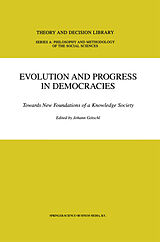Evolution and Progress in Democracies
Einband:
Fester Einband
EAN:
9781402000638
Untertitel:
Towards New Foundations of a Knowledge Society
Genre:
Philosophie & Religion
Herausgeber:
Springer Nature EN
Auflage:
2001
Anzahl Seiten:
394
Erscheinungsdatum:
31.10.2001
ISBN:
978-1-4020-0063-8
In a ground-breaking series of articles, one of them written by a Nobel Laureate, this volume demonstrates the evolutionary dynamic and the transformation of today's democratic societies into scientific-democratic societies. It highlights the progress of modeling individual and societal evaluation by neo-Bayesian utility theory. It shows how social learning and collective opinion formation work, and how democracies cope with randomness caused by randomizers. Nonlinear `evolution equations' and serial stochastic matrices of evolutionary game theory allow us to optimally compute possible serial evolutionary solutions of societal conflicts. But in democracies progress can be defined as any positive, gradual, innovative and creative change of culturally used, transmitted and stored mentifacts (models, theories), sociofacts (customs, opinions), artifacts and technifacts, within and across generations. The most important changes are caused, besides randomness, by conflict solutions and their realizations by citizens who follow democratic laws. These laws correspond to the extended Pareto principle, a supreme, socioethical democratic rule. According to this principle, progress is any increase in the individual and collective welfare which is achieved during any evolutionary progress.
Central to evolutionary modeling is the criterion of the empirical realization of computed solutions. Applied to serial conflict solutions (decisions), evolutionary trajectories are formed; they become the most influential causal attractors of the channeling of societal evolution. Democratic constitutions, legal systems etc., store all advantageous, present and past, adaptive, competitive, cooperative and collective solutions and their rules; they have been accepted by majority votes. Societal laws are codes of statutes (default or statistical rules), and they serve to optimally solve societal conflicts, in analogy to game theoretical models or to statistical decision theory. Such solutions become necessary when we face harmful or advantageous random events always lurking at the edge of societal and external chaos.
The evolutionary theory of societal evolution in democracies presents a new type of stochastic theory; it is based on default rules and stresses realization. The rules represent the change of our democracies into information, science and technology-based societies; they will revolutionize social sciences, especially economics. Their methods have already found their way into neural brain physiology and research into intelligence. In this book, neural activity and the creativity of human thinking are no longer regarded as linear-deductive. Only evolutive nonlinear thinking can include multiple causal choices by many individuals and the risks of internal and external randomness; this serves the increasing welfare of all individuals and society as a whole.
Evolution and Progress in Democracies is relevant for social scientists, economists, evolution theorists, statisticians, philosophers, philosophers of science, and interdisciplinary researchers.
Inhalt
I Foundational Aspects: Game Theory and the Evolutionary Dynamic of Democracies.- Games with Incomplete Information.- Empiricist Remarks on Harsanyi's Model of Games with Incomplete Information.- Social Ontology and the Philosophy of Society.- II Evolutionary Dynamic and Complexity in Democracies.- On Evolutive Dynamics of Knowledge Production. Some Implications for Democracy.- Market Uncertainty and the Process of Belief Formation.- Aspects of Uncertainty and Complexity in Technologies and Technosystems.- How Does Complexity Arise in Evolution? Nature's Recipes for Mastering Scarcity, Abundance, and Unpredictability.- III New Bayesian Stochastic Methods and Rule-Bounded Methods in the Social Sciences.- Bayes without Bernoulli: Simple Conditions for Probabilistic Choice.- Pragmatic Rationality and Rules.- Towards a Bayesian Theory of Self-Organization, Societal Evolution, Creativity, and the Role of Randomizers in the Societal Evolution.- IV The Psychological and Neurophysiological Aspects.- Spin-Offs of Game Theory to Social Psychology, Theoretical Biology and Philosophy.- Debates on the Utility of Risk. A Look Back to Move Forward.- Dynamic Self-Organization of the Cerebral Network: Evidence from Neuropsychology.- V Cooperation and Decision Making in Game Theory and in Democracies.- Automata for Repeated Games.- An Application of Synergetics. Decision Making as Pattern Recognition.- Name Index.

Leider konnten wir für diesen Artikel keine Preise ermitteln ...
billigbuch.ch sucht jetzt für Sie die besten Angebote ...
Die aktuellen Verkaufspreise von 6 Onlineshops werden in Realtime abgefragt.
Sie können das gewünschte Produkt anschliessend direkt beim Anbieter Ihrer Wahl bestellen.
Loading...
Die aktuellen Verkaufspreise von 6 Onlineshops werden in Realtime abgefragt.
Sie können das gewünschte Produkt anschliessend direkt beim Anbieter Ihrer Wahl bestellen.
| # | Onlineshop | Preis CHF | Versand CHF | Total CHF | ||
|---|---|---|---|---|---|---|
| 1 | Seller | 0.00 | 0.00 | 0.00 |
